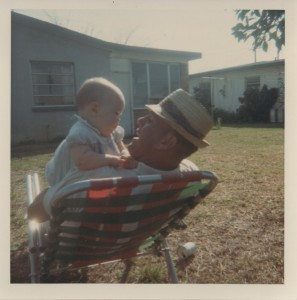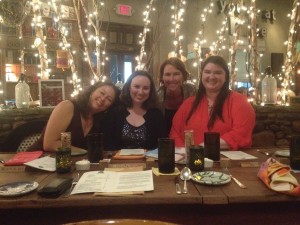 The other day, David (aka “The Man”) said to me that he thought he wasn’t as good of a man as his father had been. His father died nearly two years ago now, and there were thoughts from the family on Memorial Day (he was a Marine in the South Pacific in WWII) and photos of visits to the cemetery. So I wasn’t at all surprised this was on David’s mind, nor that he felt that way.
The other day, David (aka “The Man”) said to me that he thought he wasn’t as good of a man as his father had been. His father died nearly two years ago now, and there were thoughts from the family on Memorial Day (he was a Marine in the South Pacific in WWII) and photos of visits to the cemetery. So I wasn’t at all surprised this was on David’s mind, nor that he felt that way.
Instead, I thought, “yep, right on schedule.”
Longtime readers of this blog likely know that my own father died when I was very young – three years old. That’s me with him above. He was an Air Force fighter pilot who went down in his F-4. I have two memories of him – and those are vague, brief snippets. Otherwise I grew up with the knowledge that he’d died and I hadn’t really known him.
Which means most everything I know about my father came from other people and what they told me about him. When I was a little girl, I thought of my dad as this amazing, saintly, superheroic man who could do not wrong. Smart, handsome, loving, shining integrity, brave… Flawless. As I got older, it became clear to me that he could not have been flawless. No human being is. The fault lay in the people who told me about him, because they gave me a relentlessly sanitized version of who he’d been.
You know the old saw – “Don’t speak ill of the dead.”
Once I figured this out, I got better at asking the right questions. I asked my mother and my dad’s brother what they hadn’t liked about my dad. What habits had driven them crazy. What was the biggest fight they ever had. My grandmother stubbornly refused to answer anything like this. My father had been an angel on earth and that’s all there was to it. But the other answers – once people got over their hesitation to be critical of a man who’d died tragically, much too young – those were the stories who fleshed out his character. For the first time in my life, I felt like I had a real sense of my father as a person.
It meant so much to me.
So, now, nearly two years later, I’m not at all surprised that David’s dad is looming large in his mind. A man of great character and accomplishments, who we all loved and miss greatly. But he wasn’t perfect. I reminded David of that and we talked about the things his dad did that drove him crazy, mistakes he’d made, the biggest fights they’d had. And that helped put things back in perspective.
In some ways we always measure ourselves in comparison to our parents. A difficult thing because that’s so difficult to do with any objectivity. Especially once a parent is gone and the cheerful whitewashing begins.
But I know I’m no saint – and neither was my father. I love him all the better for it.
